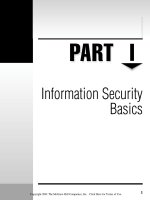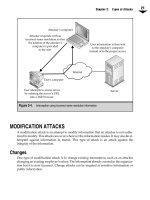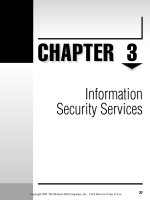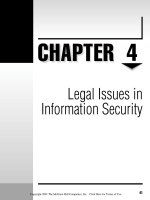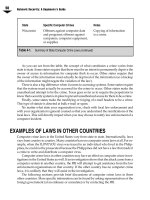Bảo mật hệ thống mạng part 8 ppt
Bạn đang xem bản rút gọn của tài liệu. Xem và tải ngay bản đầy đủ của tài liệu tại đây (119.65 KB, 6 trang )
STATE LAWS
In addition to federal computer crime statutes, many states have also developed their
own computer crime laws (see Figure 4-1). These laws differ from the federal laws with
regard to what constitutes a crime (many do not have any minimum damage amount)
and how the crime may be punished. Depending on where the crime occurred, local law
enforcement may have more interest in the case than the federal authorities. Be sure to
speak with your local law enforcement organization to understand their interest in and
their capabilities to investigate computer crime.
Table 4-1 provides a summary of the state laws. Keep in mind that state laws may
change frequently and computer crime is an area of continued research and develop
-
ment. If you have specific questions about a particular statute, consult your organiza
-
tion’s general counsel or local law enforcement.
Chapter 4: Legal Issues in Information Security
45
Figure 4-1.
U.S. states with computer crime laws
46
Network Security: A Beginner’s Guide
State Specific Computer Crimes Notes
Alabama Offense against intellectual
property
No minimum damage
level. A crime is
committed if
unauthorized access is
even attempted.
Alaska Criminal use of computer No minimum damage
level. Attacker must
obtain information
concerning a person
or introduce false
information.
Arizona Computer fraud No minimum damage
amount.
California Unauthorized access to computers No minimum damage
level. Intent must
be established.
Colorado Computer crime If no information on the
system is damaged or
destroyed, there may not
be a crime under Colorado
law even if the system
was accessed.
Connecticut Unauthorized access to a computer
system; theft of computer services;
interruption of computer services;
misuse of computer system
information; destruction of
computer equipment
No minimum
damage amount.
Delaware Unauthorized access; theft of
computer services; interruption of
computer services; misuse of
computer system information
No minimum
damage amount.
Florida Offenses against intellectual
property; offenses against
computer equipment or supplies;
offenses against computer users
Broad interpretation
of intellectual property
and crimes against
intellectual property.
Table 4-1.
Summary of State Computer Crime Laws
Chapter 4: Legal Issues in Information Security
47
State Specific Computer Crimes Notes
Georgia Computer theft; computer trespass;
computer invasion of privacy;
computer forgery; computer
password disclosure
Theft with or without the
intent to deprive the
owner is still a crime. No
minimum damage amount
except on password theft.
Hawaii Computer fraud; unauthorized
computer use
Crimes are based on
the amount of damage
actually done.
Idaho Computer crime No minimum
damage amount.
Illinois Computer tampering;
aggravated computer tampering;
computer fraud
No minimum damage
amount. Presumption
of a crime if an access
code was used by an
unauthorized individual.
Indiana Computer tampering;
computer trespass
No minimum damage
amount. No concept of
theft of information.
Iowa Unauthorized access; computer
damage; computer theft
No minimum damage
amount. Must have the
intent to permanently
deprive for theft to occur.
Kentucky Unlawful access to a computer;
misuse of computer information
No minimum
damage amount.
Maryland Unauthorized access to computers No minimum damage
amount. Theft of
information is not a crime.
Minnesota Computer damage; computer theft;
unauthorized computer access
Specifically targets
distribution of viruses and
Trojan Horse programs.
Theft must cause the
owner to be deprived of
the use of the information.
Table 4-1.
Summary of State Computer Crime Laws
(continued)
48
Network Security: A Beginner’s Guide
State Specific Computer Crimes Notes
Mississippi Computer fraud; offenses against
computer users; offenses against
computer equipment; offenses
against intellectual property
Copying information is
a crime.
Missouri Tampering with computer data;
tampering with computer
equipment; tampering with
computer users
Disclosing information or
passwords is a crime.
Possession of information
received from a computer
crime is also a crime.
Nevada Unlawful acts regarding
computers; unlawful interference
with or denial of access
to computers; forgery by
modification of information on
a computer; unlawful acts
involving electronic mail
Copying information is
a crime. Changes to an
e-mail header is a crime.
New Jersey Computer-related theft No minimum
damage amount.
New Mexico Computer access with intent to
defraud or embezzle; computer
abuse; unauthorized computer use
Unauthorized copying
is a crime.
New York Unauthorized use of a computer;
computer trespass; computer
tampering; unlawful duplication of
computer-related material;
criminal possession of
computer-related material
Copying information
is a crime.
North
Carolina
Accessing computers; damaging
computers and related materials;
denial of computer services to an
authorized user
No minimum
damage amount.
North
Dakota
Computer fraud Attempts to gain access
are considered crimes.
Ohio Unauthorized use of computer
property
Attempts to gain access
are considered crimes.
Table 4-1.
Summary of State Computer Crime Laws
(continued)
Chapter 4: Legal Issues in Information Security
49
State Specific Computer Crimes Notes
Oregon Computer crime Severity of the crime is
dependent upon what
was done, not how much
damage was caused.
Pennsylvania Unlawful use of computer Theft of information is not
a crime.
Rhode Island Access to computer for fraudulent
purposes; intentional access,
alteration, damage, or destruction;
computer theft; computer trespass
Unauthorized copying of
files is a crime. Forging
of e-mail headers to send
bulk e-mails is a crime.
Texas Breach of computer security;
harmful access
Perpetrator must know
that a security system
exists to prevent
unauthorized access.
Virginia Computer fraud; computer trespass;
computer invasion of privacy; theft
of computer services; personal
trespass by computer; computer as
instrument of forgery
Unauthorized copying
of files is a crime.
Washington Computer trespass Severity is determined
by the type of system
being accessed.
West
Virginia
Computer fraud; unauthorized
access to computer services;
unauthorized possession of
computer data or programs;
alteration or destruction of computer
equipment; disruption of computer
services; unauthorized possession of
computer information; disclosure of
computer security information;
obtaining confidential public
information; computer invasion of
privacy; computer as instrument
of forgery
Unauthorized possession
of information is a crime.
Table 4-1.
Summary of State Computer Crime Laws
(continued)
As you can see from the table, the concept of what constitutes a crime varies from
state to state. Some states require that there must be an intent to permanently deprive the
owner of access to information for computer theft to occur. Other states require that
the owner of the information must actually be deprived of the information (so a backup
of the information might negate the violation of the law).
There is also a big difference when it comes to accessing systems. Some states require
that the system must actually be accessed for the crime to occur. Other states make the
unauthorized attempt to be the crime. Texas goes so far as to require the perpetrator to
know that a security system is in place to prevent unauthorized access for there to be a crime.
Finally, some states make the modifying or forging of e-mail headers to be a crime.
This type of statute is directed at bulk e-mail or spam.
No matter what state your organization is in, check with local law enforcement and
with your organization’s general counsel so that you understand the ramifications of the
local laws. This will directly impact when you may choose to notify law enforcement of a
computer incident.
EXAMPLES OF LAWS IN OTHER COUNTRIES
Computer crime laws in the United States vary from state to state. Internationally, laws
vary from country to country. Many countries have no computer crime laws at all. For ex
-
ample, when the ILOVEYOU virus was traced to an individual who lived in the Philip
-
pines, he could not be prosecuted because the Philippines did not have a law that made it
a crime to write and distribute a computer virus.
Computer crime laws in other countries may have an effect on computer crime inves
-
tigations in the United States as well. If an investigation shows that the attack came from a
computer system in another country, the FBI will attempt to get assistance from the law
enforcement organizations in that country. If the other country has no computer crime
laws, it is unlikely that they will assist in the investigation.
The following sections provide brief discussions of computer crime laws in three
other countries. More specific information can be found by asking representatives of the
foreign government (at an embassy or consulate) or by contacting the FBI.
50
Network Security: A Beginners‘s Guide
State Specific Computer Crimes Notes
Wisconsin Offenses against computer data
and programs; offenses against
computers, computer equipment,
or supplies
Copying of information
is a crime.
Table 4-1.
Summary of State Computer Crime Laws
(continued)
TEAMFLY
Team-Fly
®
